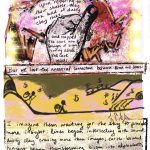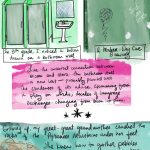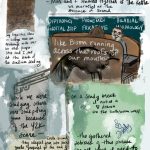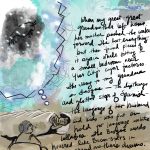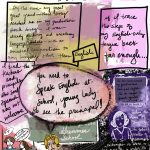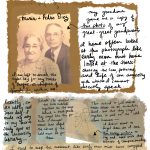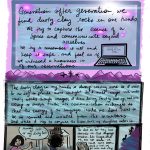My beloved spoke, and said unto me:
‘Rise up, my love, my fair one, and come away.’
—from “The Song of Songs,” attributed to King Solomon, circa 950 BCE
This planet may host a thousand worlds, or maybe millions: worlds within worlds, each nation a deck of cards, each citizen a new deal. But as certain as Gregory might be that many worlds must exist, he knew that he had claims in only two. He could live in the world which contained Sylvie, or he could live in the world which did not. He had a secret name for the world with Sylvie. He called it the Bright Forest.
Sometimes she could draw him into that world merely by speaking his name on the telephone. “Gregory?” she would begin uncertainly, and then pause. The uncertainty itself seemed to undo the normal world. It was like a fairy-call, and in that brief silence Gregory would be drawn, sometimes against his will, into the forest ruled by the misrule of Sylvie: a fairy queen, dark, with the serious expression of a girl, not of a woman. In the forest, she was at times openly a child, but no less the author of the tale. Much later, when he lived in the other world full time, the world without Sylvie, the Big World as he called it, he liked to say that he once knew someone who had thought about growing up but had thought better of it. People would smile when they heard this kind of thing, would joke about Peter Pan, but later, privately, he felt bad. Privately, he said, “What if innocence matters?” And he admitted to himself that when young with Sylvie he had looked up into windy sunlit birch trees and they had both seen the leaves flash in great numbers. And only when together! This was tantamount to a confession of faith by a fallen child, and it tore at him so much that sometimes long later he would pick up his phone and call her, and begin, uncertainly: “Sylvie…” then pause for the fairy-call in return and say, again like a child himself: “Oh Sylvie, today I turned forty-one.”
As a boy, Gregory was pale, with pale eyes that you could look straight through without interest. Drive into the suburbs and you might see dozens like him—boys with bikes and the pettiest temptations. He had gone to college as a studious lad without a clue on how to make friends or find a lover. He wrote to his parents: “Dear Mom and Dad: All is well. It looks like I have made peace with my Econ 12 T.A. and have been to the beach three times. I should be able to make your check last until February.” When it rained outside his dormitory, however, he opened his window for the wet smell. And sometimes, like a premonition, he would walk out into a night of crickets and feel a largeness in the sky—but nothing much more than that until he met Sylvie.
They met as freshmen in English Lit 221: The Romantics, where they were in the same section, and Sylvie was the only one who really cared about Byron, who she called an elitist pig. He just thought Byron a bore, though there was something to some of that stuff by Keats. She loved Keats and Shelley, too, but hardly bothered to turn in assignments. Sylvie was no “college girl,” but merely “in college” the way an animal wanders into a serious place, an office or a classroom, sniffs, and wanders out again. She told him seriously that professors murdered all poetry. That poets were in fact real people who really cared about what they were writing, and not in the least what stupid college students or professors said about it. That poets had actually seen the magic in the world and tried to communicate it, and that he should try reading their stuff under a tree without looking for the fucking underlying themes. “Seriously, Gregory. Tonight.” And she took him out at ten p.m. with his book and a flashlight and a jar of peanut butter in case they got hungry.
Of course they kissed, and her hands roamed, and they fell in love.
—
In love! There came a day when he walked into a city park in the full knowledge of being in love—looking at the other people in wonder, as if they must know. Of sharing secret amazements in the eyes of other young people, who must be, like himself, in love. If only he had known that it was all true, all along, all of it. Neither Gregory nor Sylvie were handsome people, but love does not require physical beauty, it only requires an alliance with beauty. So the two of them forgot about literature and sought beauty together everywhere—parks, houses, restaurants, bed.
In the face of this alliance with beauty, other things fell away. And so there came another amazing day when Gregory walked down the main street of the college town in full knowledge of Sylvie failing in all her classes. Not just one, but all. This information overwhelmed his previous knowledge of how the world operated. He saw how provisional and fraudulent the Big World was, and he ran into a store to buy champagne and potato chips to bring them back to her for a celebration of freedom. In the right light, this was a magnificent act, the act of a prince to his princess—and of course, after that, there was nothing for it but to fail along with her. He wrote to his parents, announcing his decision to drop out of college: “Dear Mom and Dad, I am finally taking responsibility for my own life. I think I’m about to discover a great truth, but I’m not sure what it is.”
He was, of course, about to discover the deepest extents of the Bright Forest, a world where anything might become beautiful. In the Bright Forest were green bottles and mossy curbsides, wet iron railings, bits of colored paper caught in the trees. A world like a fine photograph. He could see roads leading to dilapidated gas stations, sudden rocky overhangs, rows of maple, the gathering places of strangers. In the Bright Forest no one read newspapers on trains; they ran their fingers across the cold windowpanes, drawing circles. Later, at the station, people did not speak of schedules, they huddled against each other on benches and whispered. Or played guitars. Sometimes these same men and women would walk into the alleyways behind restaurants or lie naked together behind the hedges in a public park. In the Bright Forest, goals did not matter, only each step mattered, each momentary act—each meal of crackers and cheese, each raindrop in wintertime, each glance, each motion of the hand before the eyes. Sylvie and Gregory rented a shabby room together, got low-paying jobs, and before long the Bright Forest was everywhere: painted on the vinyl cushions of diner booths and tall against the blank stares of cars in parking lots. Each object in the natural world was but a marker for a potent force in the Bright Forest, each work along its paths a work of gods. In the distance, somewhere, was a lazy conductor beating a slow baton: Now you will sleep, will sleep, now you will make love. They would listen and lie together on long afternoons, would lose jobs for lying together on long afternoons.
Months passed effortlessly and grandly. Gregory let his head grow foggy and warm for whole weeks at a time. Sunlight would cross dusty rooms, grow weak with winter, strong with summer. He was for a long time a kind of prince, and in these, which he considered his finest hours, he was capable of the most royal actions: a quarter to a bum, a long night holding Sylvie when her father died. Prince Gregory could open his eyes to the near and the far and see them both as his dominion. Up close was Sylvie, her face, her hands, her frequent illnesses, her fears. In the distance were palaces: deeper glens, sea cliffs. Each palace they must find, or each palace would never be found by humankind, for there seemed to be no sight but their own. One afternoon in the year he was twenty would remain with Gregory for the rest of his life, a moment of greatness few people in this world can claim: the two of them standing on a small, grassy hill in a public park. A breeze was blowing, and hand in hand, the whole earth was telescoped into the power of Sylvie and Gregory, young and in love and owning it, just owning it all. Looking out, Gregory felt benevolence toward the scene, felt benevolence and generosity of spirit, as would any great man.
—
Over the course of four years, however, Sylvie and Gregory changed from eighteen to twenty, and then to twenty-two. Despite the best efforts of the forest, Sylvie discovered that Gregory retained ambitions. He found that she could sometimes look strong and serious. One night he brought a lamp up close to her face and declared that she had become a woman.
“Really?” she asked.
“Really,” he said.
She had no secrets from him, of course, and they began to talk about children. Carelessly, but they talked. “Imagine me having a baby,” Sylvie would say, squatting and pretending to pull a baby from her womb. “It would just come out, like this.” She did not know his secret term for their relationship, the “Bright Forest,” but she knew that theirs would be the first baby of some amazing world. This baby would walk with them hand in hand among its trees. They would found a dynasty born in the poverty of the Bright Forest. A dynasty!
Nevertheless, talk of a child triggered an ancient male fear which lay dormant but deep inside Gregory. Time, he saw, was hotting up. Conversations such as the following began to occur:
Gregory (condescendingly): “I don’t understand how you could have lost your fucking keys again. Look, I keep mine on this nail by the door. They’re always there and I can always find them.”
Sylvie (in tears): “What does it matter, Gregory? What does it fucking matter?”
Though such scenes became common, a greater threat arose. For the Bright Forest had a determined enemy, and his name was “Morning.” All was well when they slept in and kept the shades drawn, but sometimes Gregory would awake early with a curious restlessness, and, leaving Sylvie in the humid bedroom, he would walk out into the Morning. At Morning he heard the brass of trucks and streetcars, the cries of work and doing, could smell the clean hard smell of dew evaporating from the Big World, see mailmen. Eventually, Morning became a kind of religion with him. “Sylvie just doesn’t understand this,” he told himself, observing the early people and secretly smiling at their purpose. “These people understand something she just does not understand at all.” And when he returned to find Sylvie still asleep, the bedclothes warm to the touch and the shades peeking pinpricks of sunlight, when he touched the damp shine of sleep on her forehead and smelled the smell of long untidy human habitation, he began to be repelled.
Frightened, he’d close the door and go into the kitchen to make coffee. Once, he even called his parents for advice.
—
Sylvie began to sense a change in Gregory, and it became an uncomfortable joke between them that he was never home when she awoke. “I want to wake up together,” she would say. “We can open our eyes at the very same instant and then just lie there for a while before going to work or whatever.” And often, after his new routine of newspaper and coffee, Gregory would return to the bedroom, and, consciously steeling himself against—what, he didn’t know—he would crawl back into bed, and awaken her with much charm and grace. But this effort became deception and acting.
Gregory began to ask: was the Bright Forest merely a stepping stone to another, even finer world? And once that question had been asked, Morning was no longer enough. The idea of a baby born in the Bright Forest became more and more a threat. The Big World seemed more and more a release.
One day, Gregory got a real job downtown, to which he went at the appointed hours and worked not just for cash, but advancement. Such joy he took in arriving at a cold office in a gray a.m. would be hard to describe, but there he’d be, beaming inwardly to himself as he wrote things in files and passed messages to people in well-chosen clothing. At lunchtime, he would walk into the hustle of the city with a serious smile, and he would rejoice in the wind that tunneled through the office buildings and set the pant legs of busy men to flapping. The wind! Puzzling movements! Men themselves! The Big World held less beauty than the Bright Forest, but he found it strangely satisfying. He began to look collegiate again, tall and thin, with round glasses and a preppie vest. In the office he became liked, for he had a way of fixing his eyes on a person with an innocent concentration which brought him much good will.
His parents rejoiced that he had finally made a job last more than a few months. Hey, maybe he’d go back to school.
When Gregory told Sylvie that he enjoyed “this cycle of coming and going each day, being away from you and then with you again,” she at first believed him. She was too naive, perhaps, to realize what was going on. After all, what could really threaten the beauty of the Bright Forest? When he came home each day, she would throw herself around his neck and try to drag him into bed, but he would demur, would say he was tired, and again she would believe him. She didn’t realize that he had brought the Big World in with him, and that she, in her old sweater and sneakers, and with all that undisguised love in her eyes, looked merely out of place. Little by little, Gregory grew impatient with “her” cheap restaurants and “her” back roads, and he began to be repelled by sex. Seriously: a certain American Puritanism rose up in him against a life of pleasure. Worse, he now saw not a determined “poetry-in-real-life,” but a kind of desperate quality to all his days with Sylvie, an excess of beauty which might well appear ugly to the outsider. To people, for example, from his office.
At night, lying awake by Sylvie’s side, keeping a precious inch between himself and her flesh, Gregory would actually wonder how he could have given himself to this woman who was like none of the women he knew in his other, Big World of men and ideas. She, for example, could not keep facts straight and ask the right questions when taking a message over the phone. Just now, she was, for heaven’s sake, working in an organic food collective. She had no shine of rapid plans in her eyes, she wore no masculine jackets, and touched no colored shadows to her eyes.
“You should throw out that shirt,” he’d say. “It’s falling apart.”
“You look like a college boy in that jacket,” she would reply, as a joke. “Do they laugh at you at work?”
But he did not smile.
Late at night, he could hear the wind curl around the edges of the apartment building like a kind of warning, and sometimes, rising noiselessly, he would walk out onto the balcony and feel a kind of tremendous and lonely power in the darkness. At such times, even though it was not Morning, he would let a strength come into his limbs which thrilled him, which reminded him that he was young and might do anything. For a short time, at least, young.
—
In such a manner, little by little, Gregory became utterly alone from Sylvie, and entirely left the Bright Forest for the Big World. This should be no surprise: a new world is all we ever ask, and for the second time in his life, counting the moment he quit college, he felt mighty and free.
The final separation came in the worst way, when Sylvie was out of town, visiting her mother. Indeed, a whole month passed without a visit to the Bright Forest. Under the circumstances, far too long for it to survive.
During that month, Gregory relaxed visibly and worked late hours. So little did he think about Sylvie that he imagined that she did not think of him either. When he finally wrote his letter, on actual paper with a pen, he was sure it would come as no real surprise: “Dearest Sylvie, I’m sorry to write you a letter, but it must be done in a letter, if it is to be done at all. If you would find your own true strength, I know that you must leave me for a time. I am holding you back every moment we are together. We once said that the present should never destroy the beauty of the past, and in that spirit, I say that it has all been so beautiful that I am brought only to joy in looking back. You know what you have taught me, and I only hope the world can teach you what I cannot as time goes by. Write to me. Gregory.”
Lying face down on her childhood bed, Sylvie could only think of that word “strength.” Strength? What did strength have to fucking do with it? Either you stick with someone or you don’t. The letter had come at a dark moment with her mother, when she was hoping for a word from Gregory to cheer her, and now she thought the world had come to an end. Who was this jerk masquerading as Gregory, who had signed such a letter? A letter so full of ugliness and distrust? She reviewed the few weeks before their parting and could not remember having met this other Gregory, though looking back, she could see the signs that he had been growing inside her true Gregory.
“Now I am alone,” she thought, correctly.
This other Gregory grew a moustache, moved halfway across the country, enrolled at a new university—and after a few months he was no longer a child in the Bright Forest, but an adult in the Big World. City streets began to lose their shine and glimmer. He completed a tax return. He graduated. He obtained a job in a sales statistics firm. He fixed his own lunch to bring to work, and he began looking at advertisements for cameras and stereo systems and folding couches. In time he forgot the smell of women, or rather the women around him were so clean that he could not smell them through their blouses and sinless colognes.
About a third of the way into the fourth movement of Beethoven’s Ninth Symphony, there’s a curious moment when the chorus pauses for the orchestra to play a theme like a little brass band—a brief, bouncy military march, revving up for another grand entrance. Gregory whistled that little tune to himself almost every Morning. If he thought back to his time with Sylvie, he would say things like this to himself:
“Is it only the first moments of any new enterprise that set the whole image and beauty for what is to come? Surely everything that happened in that first moment beneath the oak when Sylvie’s hands roamed created everything that occurred in the next four years.”
Again and again he recalled specific moments of joy in the Bright Forest, but always he heard himself describing his former love to his new friends in disparaging terms: “Those were awful days after I left school, just floundering around. There was this girl who flunked out and took me with her. She, like, never grew up.”
But Gregory found no new woman in the Big World. And sure enough, six years further on, when he was nearing thirty, he began to dream again of making love to Sylvie. The dream of her would arise against his will around him in the night like a close and familiar room. He began to telephone her in Phoenix or Boulder or wherever she had moved that month and found himself talking to her in the small, childlike voice of his previous love.
“Sylvie?”
Sylvie was at first hesitant and kept her distance over the phone. Gregory took this as a sign of strength, and in his mind, judging by the new tone of her voice, his heart began to dress her in sleek, adult working jackets and straight slacks; he pictured her wearing makeup and staring him directly in the eye. Then she began to call, too. “Gregory,” would come the call. Each time, after they spoke, he would walk out into the city with new eyes and look briefly down graffiti-laden alleyways and into the beautiful shadows of the trees, revisiting the Bright Forest. But safely.
—
At last, one long holiday weekend, Gregory boarded a plane and met Sylvie in her latest town. Over the course of those six years, she had known many men and many jobs. Gregory had become the poet who was her first love, and her best, but who had abandoned her in some vague, artistic confusion. She lost her anger and told herself they had had to part in order to grow up. She could now speak in a more direct manner, dress in well-kept skirts (though not sleek adult jackets), own a car, make plans in advance, offend people less often, and generally pass as a citizen of the Big World.
When Gregory arrived, therefore, he was at first perfectly enchanted. He felt his fondest wish had come true. Sylvie had gained all the strength he had spoken of in his heartless letter! They went out to dinner without even holding hands, and Gregory was magnificent with charming talk and generous public behavior. He had learned how to smoke cigarettes, and he displayed this new talent with bravado, blowing smoke into a warm summer night. Sylvie, in her turn, acted witty, and she looked at him with the indulgence of a former lover, now grown mature, gently hinting at the secrets they had in the past, and laughing indulgently at the right moments.
Like in a movie made by the Big World.
No one in the restaurant looked at them oddly or suspected them to be refugees from another world altogether. And back at her apartment, they went about the business of getting ready for bed with coy efficiency. When the lights went out, Gregory crawled into Sylvie’s bed with confidence, eager to make love like men do to women in the Big World.
On the second day, however, Sylvie didn’t bother to comb her hair as carefully. Gregory overslept.
On the third day, spent idly at a beach, they didn’t walk as they’d both intended, with pants rolled and shoes held discreetly, but instead sprawled in the sand, making a mess with sandwich wrappers. Sylvie forgot to mention the plans she had for Gregory to meet her new friends—annoying and confusing him.
And by the end of the fourth day, when he awoke dreamy and lost, and looked deeply into the waxy magnolia leaves that rattled outside Sylvie’s window, he lost sight of Morning. He saw only that the Bright Forest had sprung up lush and fantastic from the ground all around them, once again. All day they slept and woke, slept and woke, missing the appointment to meet her friends. It wasn’t their fault, Gregory thought. When they got together, everything just went to hell.
As anyone will tell you, much is changed in one’s life merely by having a regular job. And so, even though he delayed his return flight until late into the night, Gregory did eventually drag himself to the airport.
For a time, as they sat together waiting for his flight to depart, it’s true that everyone else looked like a stranger.
Only after their final kiss, and when he found himself alone on the airplane, did Gregory begin to think about how to organize the next day. He checked his messages. His calendar. A few minutes later, he felt the vast cool relief of flying into the Big World forever.


